

Never before has Scotland been quite this deluded. The Scottish public mood is extraordinary.
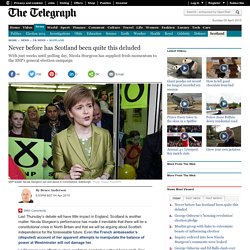
Over the past few months, millions of Scots have been baying at the moon. The most bizarre fantasies have not only circulated; otherwise sane people have given them credence. There are supposed to be massively valuable oilfields whose existence the English are concealing. Though that is about as plausible as Enoch Powell belonging to a satanic cult, it is now part of everyday discourse. Spectator appeal: tell Scots why you want them to stay – and why Britain is worth saving. It’s extraordinary to think that we could be 12 days away from the destruction of our country.

The union of Scotland and England, perhaps the most successful and consequential alliance in history, could be ended – and for the worst of reasons. The Scottish National Party has been campaigning hard, and campaigning well. Alex Salmond has excelled in depicting his enemy as a cold-hearted England (and the people they vote for) whose values are so irreconcilable with those of Scotland that the only answer is the partition of (and, ergo, the end of) Britain. As a Scot with three English children, I loathe this agenda more than I can say. But it has been a mistake for unionists to judge nationalist arguments as too bizarre to resonate. Scottish independence? Just say no!
It isn’t only among the opinion-forming set that Scottishness has been self-consciously reduced to a formulaic thing.
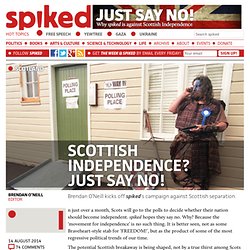
It is believed that the SNP itself based the date of its referendum on independence – 18 September 2014 – around key cultural events, in the hope that these events might ‘instil a greater sense of Scottishness among the population’. It’s thought the SNP hopes that both this year’s Commonwealth Games, which took place in Glasgow, and the seven-hundredth anniversary of the Battle of Bannockburn will help ‘generate an increased sense of Scottishness’. SNP mediamen have apparently been carefully measuring the ups-and-downs of ‘feelings of Scottishness’ among the Scottish populace – such feelings apparently went up in 1999, following devolution, and down during the Queen’s Diamond Jubilee and the 2012 London Olympics – and have worked out when these feelings might peak again and thus be politically useful. Brendan O’Neill is editor of spiked. Scotland’s many subcultures - Demos Quarterly. In just a few weeks’ time, the people of Scotland will vote on whether or not to leave the United Kingdom.
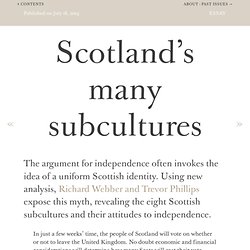
No doubt economic and financial considerations will determine how many Scots will cast their vote. What Britain will lose if Scotland goes. On 19 September, people over all Britain could wake up in a diminished country, one that doesn’t bestride the world stage but hobbles instead.

If Scotland votes to leave the United Kingdom, it would be Britain’s greatest ever defeat: the nation would have voted to abolish itself. The rump that would be left behind after a Scottish yes vote would become a global laughing stock. 12 things that £1400 UK Dividend could buy. New financial analysis from HM Treasury shows that every one of us in Scotland will be £1400 better off every year staying part of the UK than we would be if we voted for independence.

But how far does £1400 go? Here are 12 examples: 1. An overseas holiday for two with cash leftover for sun cream. Average cost: £680 per person for a 10-day jaunt. Source: Telegraph, August 2012. SIMON HEFFER: How can this great, UNITED Kingdom - which gave the world Christian civilisation - just tear itself apart? By Simon Heffer PUBLISHED: 23:04 GMT, 19 April 2014 | UPDATED: 02:03 GMT, 20 April 2014 On this holiest of days for Christians, when churches and chapels will be filled with people rejoicing at Jesus Christ’s Resurrection, we should reflect on the central place Christianity still occupies in our apparently secular society.

We are a nation, a people and a civilisation imbued with its values. We have exported them around the world. Our Queen is Supreme Governor of an Established Church, and around the Commonwealth her realms and former colonies still project and embrace Christian ideals. The Duke and Duchess of Cambridge, pictured, are the 'high representatives' of our nation As has been clear from the welcome given to the Duke and Duchess of Cambridge – and their infant son – in New Zealand and Australia, the high representatives of our civilisation are met with fellow feeling.
It has not always been easy, however. Britain, after all, would hardly have had an imperial project without Scotland. NO to Separation. Nick Curtis: Scotland would not be bonnie or brave on its own - Comment. All of which is a lengthy defensive preamble to saying that I wish the Scots would just bloody SHUT UP about independence.
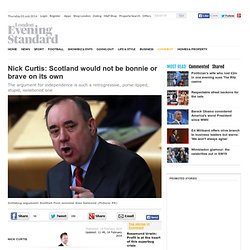
I mean, when did the Battle of Bannockburn happen? 1314, that’s when (or as we say in England “about quarter past one”). Let it go, already. We Scots have a clear moral duty this year – to stay British. When, after 10 years as prime minister, Tony Blair gave his resignation speech at Trimdon Labour Club in 2007, he described Britain as "the greatest nation on earth".
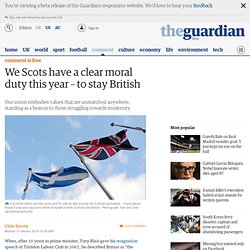
This was met with a horrified gasp from the country's opinion formers. What was this guy on? What was this flag-in-the-front-yard boosterism? What is the point of Scottish nationalism? Nigel Farage is right; anti-Englishness drives much of Scottish nationalism.

In fact Anglophobia has always been at the heart of all British Isles Celtic nationalism, particularly the Irish and Scottish varieties. Unlike French nationalism, for example, which is based on a positive view of French culture, Scottish and Irish nationalisms are largely based on a negative view of the ‘outsider’, meaning the English. There are obvious historical reasons for this negative Celtic fringe view of the English. English dominance, both economic and cultural, has been so powerful it has hugely influenced the whole world, from America to Hong Kong to Australia and everywhere in between. With such world-wide influence, what chance of cultural individuality had the poor Celtic fringe of Scotland, Wales and Ireland? Scottish independence? Yes, but only on these terms.
The Scots Numpty Party (SNP) has managed to defeat the attempts of the unionists who deliberately devised the electoral system to thwart single party government (and hence leave independence off the practical political agenda) and get a majority in Scotland. The SNP leader Alex Salmond can now call a referendum on independence . However, to have a referendum which is binding, the SNP needs the sanction of the UK Parliament. From his public comments David Cameron appears to accept that such a referendum would be binding because he has stated since this SNP victory that if a referendum was held he would campaign for a NO. Whether or not Scotland would vote for independence is debatable. Polls consistently show a majority against, although there are always a substantial number of “don’t knows”. 1. 2.
Open Unionism » A forum to discuss new ideas and perspectives on Unionism from across the United Kingdom and beyond. Scottish independence: The only way to save the Union is to stop throwing cash at the Scots. By Melanie PhillipsUPDATED: 09:12 GMT, 16 January 2012 Oh, the irony of it! The fear that the Scots are heading for a referendum in which they would vote for independence from England drove the Prime Minister last week to launch a campaign to prevent such an outcome. David Cameron made a passionate argument to save the Union, provoking a fiery counter-attack from Scotland’s First Minister and SNP leader, Alex Salmond. The unionist and nationalist camps thus glowered at each other across the Tweed. Better Together: The No Declaration. Unionism in Scotland. Unionism in Scotland is a political movement that seeks to keep Scotland within the United Kingdom in its present structure as one of the countries of the United Kingdom.
It is part of the wider British unionist movement and is closely linked to British nationalism and the notion of Britishness. There are many strands of political Unionism in Scotland, some of which have strong ties to Unionism and Loyalism in Northern Ireland. Unionism is a movement often categorised primarily as being in opposition to Scottish independence. The Union[edit] The Scottish Unionist Party - Home. The Scots must not leave the Union. For the few people who were in any doubt, the suggestion that an independent Scotland would inherit neither the United Kingdom's membership of the EU, nor the rebate negotiated by Mrs Thatcher, should put the final nail in the coffin of any supposedly logical argument in favour of independence.
Were this a rational debate, the matter would be decided: the no-voters would have it. Yet there remains something more insidious and elusive to contend with: the emotional argument. For various reasons which I shall not explore here, there is a portion of the Scottish population that feels that their national pride would be best expressed by splitting from the United Kingdom. They drape themselves in the Saltire, dance a Ceilidh, play the bagpipes, and find that the hair on the back of their necks stand on end. Then, for some reason, they conclude that they'd be better off alone. I would like to counter that emotional pull. Anyway, my point is this. Scottish independence would delight our enemies and dismay our friends. The British armed forces have had a long and illustrious history, but face perhaps their greatest challenge in the coming years. Better Together: The patriotic all-party and non-party campaign for Scotland in the UK.
The Union as Seen from Afar. The best case for the Union. David Cameron's speech in Edinburgh yesterday was pitch-perfect. Rory Stewart: People should remember what they love about the UK. Tuesday 7th February 2012 | 07:00 Writing exclusively for PoliticsHome about Scottish independence, Conservative MP Rory Stewart says that people need to remember 'what they love' about the United Kingdom. We are in danger of losing our country. And we don’t seem to care. A great nation, formed by great people, over centuries, is to be split. Why? There is a small core of eccentric Scottish nationalists, inventing myths about gaelic and kilts, and a global ‘hi-tech’ economy, and some too who in England, wave St.George’s flags, and spout eighteenth century prejudices.
The British establishment strikes back. Custom byline text: Shame on you, Alex Salmond, for selling us out to the Bullingdon Club. Britons from Scotland are the butt of many jokes. They are, apparently, financially cautious, fond of liquor and mistrustful of fruit. They delight in sexualised invertebrate torment and underestimate in their provision for female public toilets. It's not too late to call the Nationalist bluff- England would do well out of Scottish independence. By Steve DoughtyUPDATED: 14:11 GMT, 30 January 2012.
Harry George Mulligan: Scotland Should Welcome Britain's Diversity. Time to take Britain out of our greatness. Alex Salmond’s Hugo Young lecture, delivered yesterday evening in King's Place, the Guardian's headquarters, was an enjoyable affair. It was also, thanks to Tory policy and IPPR’s research, a potentially important moment - a turning point, even, in what can legitimately be called ‘this island’s story’. A generous offer to Scotland could keep the Union safe.